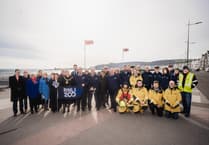Many across the island by now will have seen the startling pictures of a seal caught in heavy duty rope in waters south of the island.
The image, by local photographer Susie Mackenzie-Fidlin, shows the mammal resting on a rock at The Sound.
It was shared on social media on September 9 to vast outcry from many islanders.
In the post, Mrs Mackenzie-Fidlin stated that the sea had been like this "for a few weeks", with one commenter suggesting it has been seen as early as late August.
Calls were made for an official group to rescue the seal and remove the rope, however it is feared nothing can be done due to the logistics of attempting to capture the animal safely.
The Manx Wildlife Trust said that it is unlikely this particular individual seal can be helped, because of the risk to the seal itself and to the people trying to help.
They said the seal does look healthy and appears to still be feeding.
Dr Lara Howe, a marine officer with the charity spoke to Manx Radio about the seal, and highlighted the wider issue around marine litter in the waters around the island.
She said: ’We’ve all seen many documentaries about the issues of marine litter around the world, but this highlights the fact that the Isle of Man is not exempt from that and we do have a marine litter problem here.
’That’s clearly been seen by this individual seal and sadly other seals that have been reported to us over the more recent years.’
Marine litter, is human-created waste that has either been deliberately or accidentally released into the sea.
According to the European Commission: ’Marine litter is a global concern, affecting all the oceans of the world. Every year, millions and millions of tonnes of litter end up in the ocean worldwide, posing environmental, economic, health and aesthetic problems.’
When asked what island residents could do to prevent incidents like this in the future, Dr Howe said: ’There [are] lots of things, and absolutely everybody can help.
’I know this is a really sad story, and we all feel very frustrated that we’re unable to help this individual, but going forward absolutely there’s so much everyone can do and everyone can get involved to try and stop litter entering the marine environment.’
She suggested higher participation in beach cleans, either via organisations such as Beach Buddies, or on an individual basis, that visitors to the island’s beaches take their waste home with them when bins are full, and also highlighted the Fishing For Litter campaign, which works with fishermen and the fishing industry to reduce the amount of plastic pollution and marine litter in the sea.
She said: ’I think everyone is responsible for this, and all of us as a society need to make sure we do our bit to protect our marine environment.




